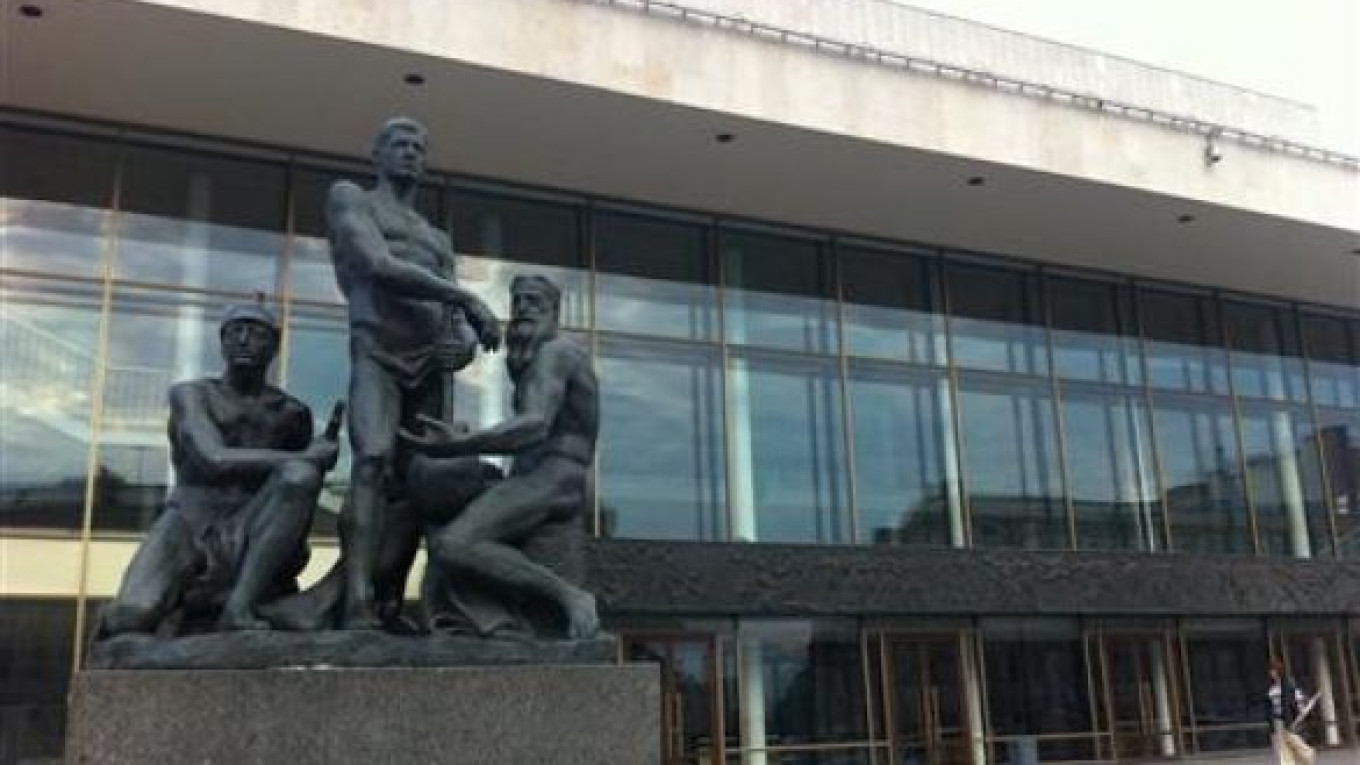ST. PETERSBURG — A new five-story business center and hotel complex due to appear next to the Oktyabrsky concert hall is causing consternation among the city’s Greek community as well as preservationists.
The design for the new building, set to be constructed on the former site of the hall’s ticket office, has already been selected and is being assessed by the authorities. The St. Petersburg Greek community fears that the project will obstruct the Ioannis Kapodistrias memorial located next to the ticket offices.
Nine architectural studios took part in the tender to design the building. The project’s investor, Solo, invited representatives of preservationist movements such as Living City and specialists of the State Cultural Heritage Committee onto the jury in an attempt to broaden public support for the project. The winning design was that of AMM studio, headed by Yury Mityurev, the city’s former chief architect. According to the studio, however, his authorship was unknown to the jury during the selection process. They claim that the design was selected because it is in harmony with the surrounding buildings.
This is a daring promise, as Grecheskaya Ploshchad (Greek Square, as the square in front of the concert hall is known) is already one of the city center’s oddest architectural ensembles. Surrounded by the neoclassical Children’s Hospital No. 19 and various 19th-century buildings, it used to be the setting of the Greek Dmitry Solunsky Church, which was adorned by multiple cupolas and was an emblem of the Byzantine building style in St. Petersburg. In a startling architectural metamorphosis, however, this building was torn down by the Soviets in 1961 and replaced by the concrete Oktyabrsky Concert Hall, a building that Joseph Brodsky, in a poem on that occasion, described as an “ugly flat dash.”
Another item on the square’s architectural agenda during the last few years was the Greek Center, a business center located directly opposite from Oktyabrsky. The original early 19th-century three-story building was dismantled in 2007 and replaced by a glass cube behind a pseudo-restoration of the old facade. The new business center now to be built at 6 Ligovsky Prospekt is to achieve a similar synthesis between functional business space and architectural mimicry. Its style is described by the studio as “classical.”
The idea to replace the ticket office pavilion with a multistory building is not new but has been under consideration for about seven years. An earlier investor, Rolis, had already selected a project. The company had to be reorganized, and the building rights fell to the management company, Solo, which rejected the previous design. In 2011, Solo presented its current project to build a 4,305-square-meter building complex on the site. The first floor is to accommodate the ticket office, while the upper levels are to be divided between office space for concert hall staff and hotel space for visiting musicians.
A major opponent of the project is the St. Petersburg Greek community organization Petropolis. Since the church was destroyed, the only trace of Greece’s impact on the area is the name of the square and the adjacent street, Grechesky Prospekt.
In 2003, when the city celebrated its 300th anniversary, the community received some consolation, with a statue being erected to commemorate Ioannis Kapodistrias, a diplomat who served in Russia under Alexander I and who later became the ruler of Greece.
Kapodistrias currently looks contemplatively out over Ligovsky Prospekt from a small round plaza surrounded by greenery on the corner of the park area leading to Ulitsa Nekrasova.
Harlampy Apachidy, chairman of the city’s Greek community, fears that the statue’s view of Ligovsky Prospekt — and with it, people’s view of the statue — will soon be blocked.
“If this project is carried out, the monument will turn into an awkward architectural appendix of the five-story building’s right wing and will be blocked from view from the side of Grecheskaya Ploshchad,” he was quoted by Fontanka.ru as saying.
Petropolis appealed to City Hall on June 22. The Greeks say that they are not against the building project itself and that they simply ask that efforts be made to preserve the visibility of the statue, for instance by transferring it into the middle of the square. So far, their appeal has gone unanswered.
Concern has also been expressed by the preservationist movement Living City, which is worried about the additional congestion the new complex would bring to the city center.
“We think such a business center is totally unnecessary,” Living City spokeswoman Antonia Yeliseyeva said. “There will be more people and more cars, the building cannot provide parking space for all those cars, and the city is already overcrowded.”
A Message from The Moscow Times:
Dear readers,
We are facing unprecedented challenges. Russia's Prosecutor General's Office has designated The Moscow Times as an "undesirable" organization, criminalizing our work and putting our staff at risk of prosecution. This follows our earlier unjust labeling as a "foreign agent."
These actions are direct attempts to silence independent journalism in Russia. The authorities claim our work "discredits the decisions of the Russian leadership." We see things differently: we strive to provide accurate, unbiased reporting on Russia.
We, the journalists of The Moscow Times, refuse to be silenced. But to continue our work, we need your help.
Your support, no matter how small, makes a world of difference. If you can, please support us monthly starting from just $2. It's quick to set up, and every contribution makes a significant impact.
By supporting The Moscow Times, you're defending open, independent journalism in the face of repression. Thank you for standing with us.
Remind me later.


